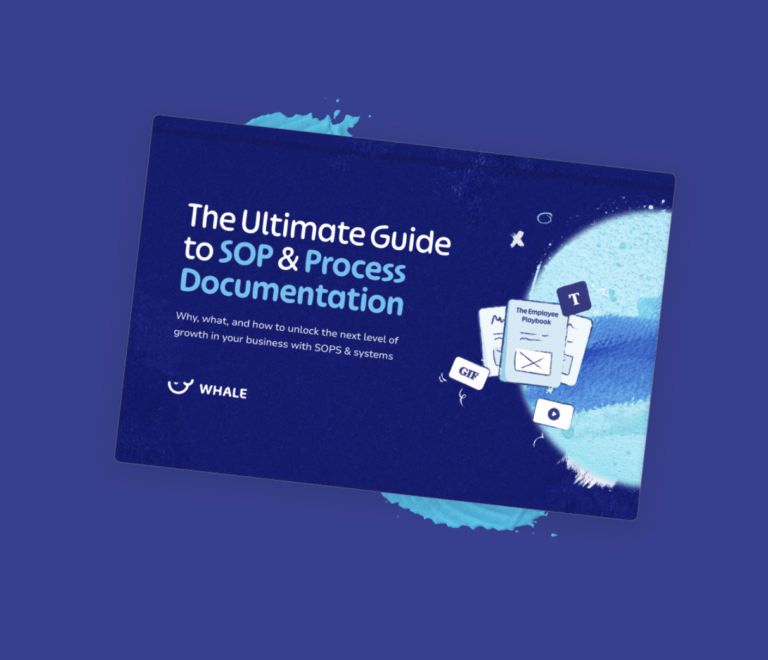Time management was all the rage in the 90s but there’s a whole new level of complexity in today’s world. Time management in today’s world isn’t going to cut it; it’s all about harnessing the power of time.
Want to grow your business? Reach your rocks and quartly objectives? Take a course? Or even just start a fitness regime, have some downtime or spend time with the family?
No one’s got time for that! And yet we all get the same 24 hours each day. How come some people seem to get so much done? 🤔
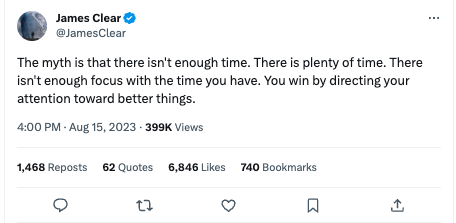
Harnessing the power of time
Time management is the process of organizing and planning how to divide your time between different activities. The problem is that time management looks at time from the perspective of scarcity instead of an asset.
The question isn’t how to manage time better but rather how to harness the power of time?
But how, when you’re convinced you already maximize your time?
How to calculate efficient use of time
Here’s a quick exercise, and yes, this is something you’re going to want to make time for.
With your morning coffee

Write down, more or less, the hours you spend each week on time-wasters; digital and otherwise including social media, YouTube black hole scrolling, meetings and even spending time with people you didn’t want to spend time with (your kids don’t count!), manual tasks or anything else you can think of.
= X hours /week
Take this number and multiply it by 52. That’s how many hours you’re spending on activities that don’t mean anything to you! 
Still convinced you can’t grow your business, reach your rocks, start a new fitness regime or just have downtime?
What would you do with that extra 250, 500 or more hours in your life in a year?
The Trap of Time Management
“Time management promises us that if we become more efficient, we can make space to accommodate all of our to-dos comfortably. And yet, time management is like digging a hole at the beach: the bigger the hole, the more water that rushes in to fill it…This is not to say that time management has no value. Productivity is important. But in a world where burnout is running rampant, we also need strategies for eliminating volume instead of simply accommodating it.” (HBR)
There’s no point in managing time for the purpose of creating more things to do. There are always things to be done but you and your team could be productive working on the wrong things and that isn’t going to take you to the next level.
“In the long-run, prioritization beats efficiency.”, says the master of Atomic Habits, James Clear.
The point being, that you can be extremely efficient at doing the wrong things. You’ll be efficient but never reach your goals.
Time shouldn’t be something to be managed. Time should be harnessed to ensure focus and deliver the kinds of results you want to see in your business and life.
How to Harness Time Management: 6 Steps
- Always be Systemizing
- Remember time is Money
- Get things done faster
- Have a plan and implement a process
- Review to Fast Forward
- Be intentional with your time
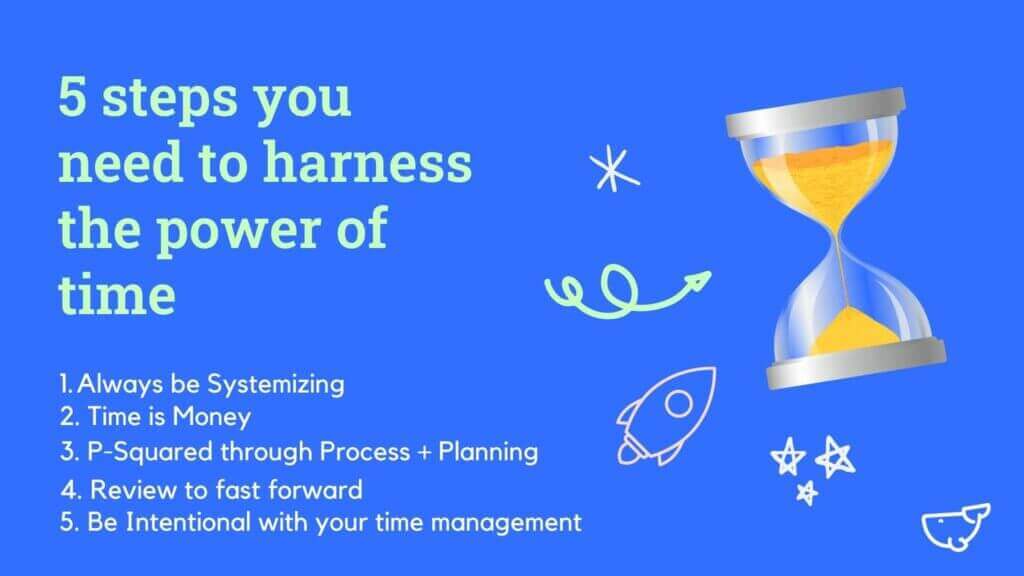
1. Always be Systemizing
We’re mentioning this point first because it’s the whole reason Whale was started in the first place. Gary, Bram, and Sam realized you can solve a problem a thousand times (or more) or you can solve it once with a system.
You can focus on a goal which is good but is often too open to external factors. If you focus on the system that creates the right behavior to reach the goal then you’re more likely to create a pattern of success.
For example, you often have customers contacting you with the same query but in slightly different contexts. The goal is a great customer experience.
You can reply to the same query each time with a manual response hoping that your team members remember all the relevant points to ensure customer satisfaction.
OR
You can simply document the process and ensure all team members are equipped with a consistent response, even if the use case varies slightly. Voila, you have a great customer experience process that is systemized, supported by an SOP customer service approach to guarantee consistency and quality in every interaction.
The more you can systemize a process, the easier it is to maintain. It frees up time and energy to focus on other activities.
You can apply this to business and to life!
Have the intention of being productive but then life seems to get in the way?
You may have realized that setting up automatic payments on your online banking helps you invest and pay bills on time. You can apply this to your time too. Charge your phone in another room or remove apps that decrease your productivity. Or even schedule time each day when you tackle certain activities.
By systemising business processes, you’ll save time, boost your chances of success, and enhance your peace of mind. Who doesn’t want that?
2. Remember, Time is Money
t’s an age-old saying but as it happens it’s also true! 
Ultimately, he says you can calculate what an hour of your time, or your employee’s time is worth. Then think about what tasks you and your team are doing in that time.
As a Business Process Consultant, he understands that companies struggle with things falling through the cracks. He creates the business processes that allow them to:
- Decrease time spent on tasks which could be automated.
- Quickly train and better retain new talent,
- Always know who is accountable,
- Ensure continuity of service for their customers.

Here’s how he applies it:
“I take my Effective Hourly Rate and compare it to market rates for (fill in the blank task). I then make an estimate of how long the task takes me and also the time it would take a freelancer to do the same task.
“Oftentimes, the time savings is enough for me to go ahead and outsource the task. The unexpected surprise is that a good freelancer can most likely do it faster (and cheaper) than me but also come up with a much better result than if I did it myself.
The EHR has freed me to do more valuable tasks in my business: the ones that only I can do.”
If you think about time in this manner, you’re likely to become more focused on the output delivered by you and your team.
It may not be worth paying out all that overtime (click here to calculate your overtime pay). You instead may want to think about what could be outsourced or eliminated all together.
3. Get things done faster!
This may seem rather ridiculous to say but often you can achieve the same outcome but get the same task done faster.
How?
- Utilize AI
- Utilize a template for a task so you don’t have to create something from scratch
- Use calendar blocking to mark time out in your calendar to start and finish a specific task. You’ll find when you focus on ONE task instead of multiple tasks at a time, you’re likely to be a lot more efficient.
And lastly like Nike said, JUST DO IT. We often spend way too much energy thinking about starting than we do actually doing a task.
If you’ve gone through the process of identifying whether a task is important or not and have come to the conclusion that it’s going to help you reach the next level in your business / life, then go ahead and JUST DO IT!
If you’re still getting stuck then check out the next step…
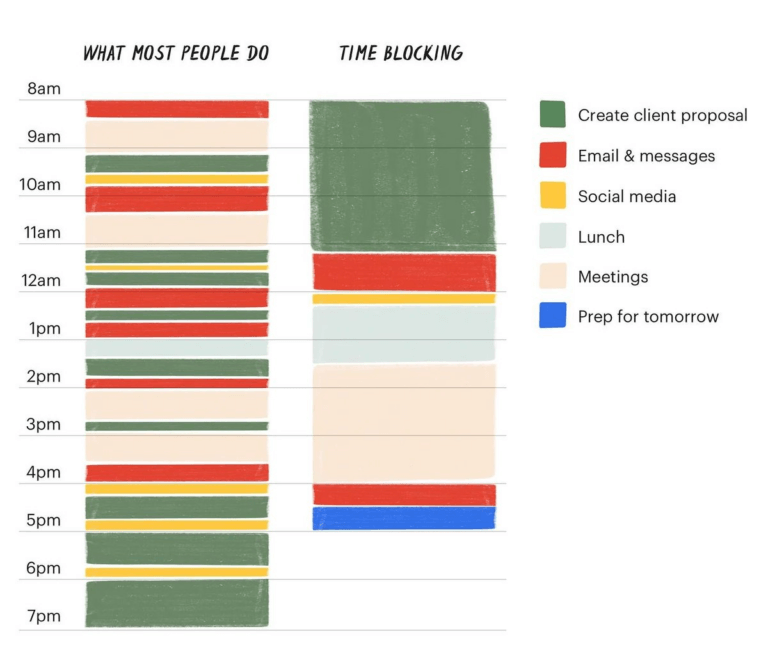
4. Have a plan and implement a process
Brittany Dixon, of Brittany & Co., is a Podcaster, Business Strategist, and Productivity Coach. Her motto is Efficiency = Scalability!
As a mother of twins, she helps highly driven entrepreneurs work smarter, not harder, helping them incorporate back-end systems and accountability into their business.
She states that P-squaring your day, the day BEFORE will work miracles!
PROCESS + PLAN

“Map out your entire next day (THE NIGHT BEFORE!). Look at your calendar and your tasks and map it all out hour by hour so that you have a solid plan to start the day and hit the ground running as soon as the coffee hits your veins!
Just like you’re more likely to eat healthily if you have food prepared, so you’re more likely to be more successful if you’ve prepared. This could be setting up client notebooks with bullet points, getting podcast outlines ready, gathering things needed for meetings, etc.
And as for process!
Make sure you have optimized your process for going things.
Be sure to check out our eBook if you want to know why we’re so passionate about our mission!
5. Review to fast forward
When 61% of the average workday is spent on tasks of little or no value, it’s time for a change.
How often do you review what’s working and what isn’t?
It may seem counter-intuitive to take time out each week or each month but just taking an hour to reflect on where you’re spending your time and the correlated results could catapult you forward in leaps and bounds.
Irrespective of what you do, you have the power to reflect, review and decide how you want to move forward.
- Are your tasks in line with your rocks? I.e. quarterly objectives? Reflect on where you could better spend your efforts.
- Don’t have enough time to achieve everything on your to-do list? Where can you systemize and automate certain activities?
- Trying to do everything yourself? Who can you onboard to help?
- What’s working? How can you double down on those activities?
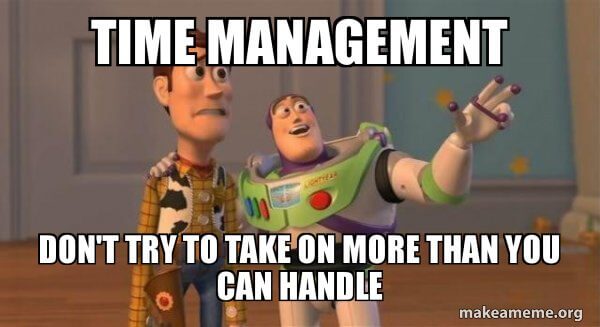
6. Be Intentional with your time
“Have you ever gotten lost in a mall? 
“The physical world is full of design choices like this—seemingly random decisions that are actually made with intention, because of a specific agenda. Software isn’t any different.”
The point is that technology is set up to capture your attention and time!
So if you aren’t intentional about how you’re spending your time, someone else, or something else, will decide it for you. Including Mark Zuckerburg or Elon Musk. After all, we can assume he wants something after spending nearly forty-four billion dollars on Twitter.
Being prolific, says Adam Grant in his article “Productivity isn’t about Time Management”, is not about time management. Rather it’s about attention management or harnessing the power of time to focus on doing the right things for the right reasons at the right moments.
“Time management says we should eliminate distractions altogether — not just interruptions from other people, but also the times when we interrupt ourselves. If you’re getting sucked into social media, you’d need to stop cold turkey. Attention management offers an alternative: Be thoughtful about the timing of those distractions.”
Here’s to harnessing the power of time!
Want to scale but don’t know where to start? Take our Readiness to Scale Assessment below
FAQs about Time Management
What are the 5P's of time management?
The "5 P’s of Time Management" are Prioritize, Plan, Prepare, Pace, and Persist.
By prioritizing activities, having a plan, preparing for action and following a specific pace with persistence, it provides a framework to harness time.
How can I free up more time an an entrepreneur?
Entrepreneurs can free up time by;
- Systemizing their business
- Utilizing a business framework like EOS (the Entrepreneurial Operating System)
- Utilizing SOPs and processes. SOP Platforms like Whale streamline process creation by offering templates, AI-driven documentation, and a centralized hub for storing and sharing workflows.
- Utilizing Subject Matter Experts in all areas of business.


